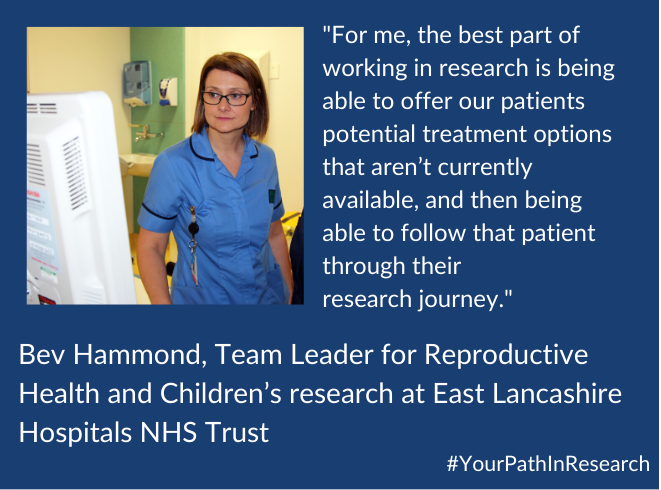
Bev Hammond is Team Leader for Reproductive Health and Children’s research at East Lancashire Hospitals NHS Trust and a national NIHR Champion for reproductive health and childbirth, representing Greater Manchester
As part of the NIHR’s #YourPathInResearch campaign, Bev recalls how a chance encounter led to her working in research – and explains how rewarding she finds her job. She writes:
I qualified as a midwife in 2006 and initially started a PGCE teaching qualification in post-compulsory education in health and social care, but I changed direction and joined what was then called the Primary Care Trust (PCT) as an Infant Feeding Coordinator. In that role I worked for Central Lancashire PCT where I trained the nursery nurses, health visitors and children centre staff from within the public health team. It was a strategic role that focused on health promotion, public health initiatives, and looking at better outcomes for mums and babies.
I then did the same job for 14 months over in Liverpool, and after that I became involved in research - and it happened by complete chance. I had taken my daughter to a dietician’s appointment at Royal Blackburn Hospital when I bumped into an old colleague of mine who was working in the hospital’s research department. She told me there was a research midwife post going in their team, but the application deadline was that very night. So I went home, filled in the form, and thankfully got the job.
As soon as I read the job description, I thought ‘wow, that sounds so interesting’. It took me back to my roots around improving health outcomes and evidence-based practice. I had that experience and that’s really what got me here. It was a very spur of the moment change of direction, but because I had been used to doing audit and a lot of project management in my previous job, it was actually a natural transition for me.
I have been here now at East Lancashire Hospitals NHS Trust for six-and-a-half years and since June 2019 I have been the team leader. I get a lot of satisfaction from my job and being part of that whole team approach. I also find it very rewarding to see new guidelines come to fruition from the evidence that we have helped gather through research. It’s so good to see that dynamic change to practice and witness change being made for the better.
In this role you get the satisfaction of patient contact, but you are also working with everybody right across the trust; Involvement with those in family care but also wider partners. I have also been able to widen my knowledge base because I am the trust’s research lead for gynaecology, early pregnancy and fertility. My knowledge and skills have increased tremendously by doing this role and I have been supported to do a lot of background learning, training and personal development.
We also do a lot of cross-team working and at the moment we are setting up a new respiratory study that’s got an urogynaecology element as well. We are also working with our colleagues in the Multi-Disciplinary research team. So we are never standing still in terms of variety!
But for me, the best part of working in research is being able to offer our patients potential treatment options that aren’t currently available, and then being able to follow that patient through their journey. It’s not always nice; we deal a lot with patients who are trying to get pregnant, women who have had miscarriages or pre-term babies. But the patient satisfaction makes it all worthwhile and you can build a real sense of continuity because we are the specific point of contact for that woman through her research journey. Sometimes that can’t always happen in regular midwifery.
Ultimately, what I do is about being able to change patient care for the better and having that direct impact on the future. You should hope that everybody goes into working for the NHS hoping to make a difference, but I really do believe you get to do that in this role. It’s about aiming to provide that gold standard of care that everybody strives for, and in this team we always make sure we do the very best we can.


